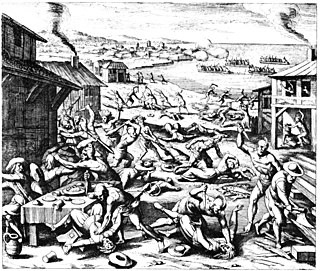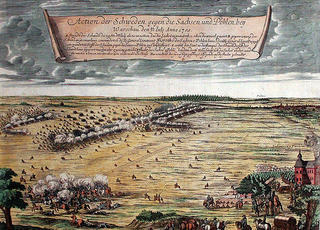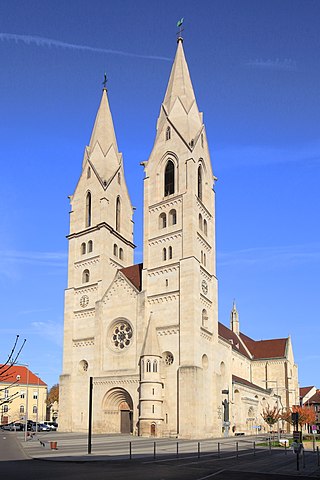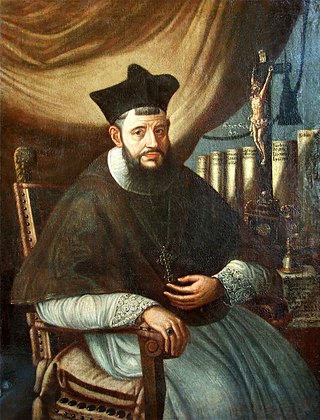
1622 (MDCXXII) was a common year starting on Saturday of the Gregorian calendar and a common year starting on Tuesday of the Julian calendar, the 1622nd year of the Common Era (CE) and Anno Domini (AD) designations, the 622nd year of the 2nd millennium, the 22nd year of the 17th century, and the 3rd year of the 1620s decade. As of the start of 1622, the Gregorian calendar was 10 days ahead of the Julian calendar, which remained in localized use until 1923.

1705 (MDCCV) was a common year starting on Thursday of the Gregorian calendar and a common year starting on Monday of the Julian calendar, the 1705th year of the Common Era (CE) and Anno Domini (AD) designations, the 705th year of the 2nd millennium, the 5th year of the 18th century, and the 6th year of the 1700s decade. As of the start of 1705, the Gregorian calendar was 11 days ahead of the Julian calendar, which remained in localized use until 1923.

The Evangelical Church in Germany, also known as the Protestant Church in Germany, is a federation of twenty Lutheran, Reformed, and United Protestant regional Churches in Germany, collectively encompassing the vast majority of the country's Protestants. In 2022, the EKD had a membership of 19,153,000 members, or 22.7% of the German population. It constitutes one of the largest Protestant bodies in the world. Church offices managing the federation are located in Herrenhausen, Hanover, Lower Saxony. Many of its members consider themselves Lutherans.

Disputation is a genre of literature involving two contenders who seek to establish a resolution to a problem or establish the superiority of something. An example of the latter is in Sumerian disputation poems.

Daniel Ernst Jablonski was a German theologian and reformer of Czech origin, known for his efforts to bring about a union between Lutheran and Calvinist Protestants.

George Cassander was a Flemish Catholic theologian and humanist.

Melchior Klesl was an Austrian statesman and cardinal of the Roman Catholic Church during the time of the Counter-Reformation. He was minister-favourite of King and Emperor Matthias (1609-1618) and a leading advocate for peace between the empire's different confessional leagues before the Thirty Years' War.

Sophia Charlotte of Hanover was the first Queen consort in Prussia as wife of King Frederick I. She was the only daughter of Elector Ernest Augustus of Hanover and his wife Sophia of the Palatinate. Her eldest brother, George Louis, succeeded to the British throne in 1714 as King George I.
The Vicariate Apostolic of Northern Germany, known for most of its existence as the Vicariate Apostolic of the NorthernMissions, was a Catholic missionary jurisdiction established on 28 April 1667. It belonged to a vicar apostolic in predominantly Protestant Northern Europe.

The former Roman Catholic Diocese of Wiener Neustadt in Lower Austria existed from 1469 to 1785. In 1990, it was re-established as a titular see which is held by the bishop for the Military Services in Austria.

The War of the Jülich Succession was a war of succession in the United Duchies of Jülich-Cleves-Berg. It lasted between 10 June 1609 and 24 October 1610, resumed in May 1614 and finally ended on 13 October 1614. The first round of the conflict pitted Catholic Archduke Leopold V against the combined forces of the Protestant John Sigismund, Elector of Brandenburg and Wolfgang Wilhelm, Count Palatine of Neuburg, ending in the former's military defeat. The representatives of Brandenburg and Neuburg later entered into a direct conflict after their religious conversion to Calvinism and Catholicism respectively. The conflict was further complicated by the involvement of Spain and the Netherlands making it part of the Eighty Years' War, as well as the European wars of religion. It was finally settled by the Treaty of Xanten, whose provisions favoured Spain.

Gerhard Wolter Molanus was Lutheran theologian and abbot of Loccum.

The Capture of Oppenheim or the Spanish capture of Oppenheim took place on 14 September 1620, at Oppenheim, Electorate of the Palatinate, between the Spanish army commanded by Don Ambrosio Spinola, Marquis of the Balbases, against the forces of the Electoral Palatinate led by Joachim Ernst, Margrave of Brandenburg-Ansbach, during the Palatinate campaign, in the context of the Thirty Years' War. The Spanish troops under Spinola, with a great maneuver of distraction over Worms, deceived the Protestant army of Joachim Ernst, and captured the important town of Oppenheim without too much difficulty, causing a severe blow to the Protestant forces.

The siege of Aachen took place in 24 August 1614, when the Spanish Army of Flanders, led by Ambrogio Spinola, 1st Marquis of the Balbases, marched from Maastricht to Germany to support Wolfgang Wilhelm, Count Palatine of Neuburg, during the War of the Jülich Succession. Despite its status as a free imperial city, Aachen was under the protection of John Sigismund of Brandenburg, Neunburg's ally, and then rival, in the battle for the United Duchies of Jülich-Cleves-Berg. In 1611, the Protestant population of Aachen had revolted against the Catholic city council and had seized power. When the Holy Roman Emperor Rudolf II, observing the Peace of Augsburg, had ordered the previous state to be restored, the Protestants had allied themselves with the Margraviate of Brandenburg. The unexpected arrival of a Spanish army at the gates of the city, however, caused the Protestants to lose courage and surrender Aachen to Spinola. A Catholic garrison was installed and a process of re-Catholicization began.

Leopold Karl von Kollonitsch or Lipót Kollonich was a cardinal of the Holy Roman Church, Archbishop of Kalocsa and later of Esztergom, and Primate of Hungary. Also a count of the Holy Roman Empire, he was a leading figure of the Hungarian Counter-Reformation.
The Düsseldorf Cow War was a military conflict over the status of church property in the duchies Jülich and Berg. It lasted between June and December 1651, pitting the Catholic Palatinate-Neuburg against the Protestant Margraviate of Brandenburg. It ended in peaceful settlement, confirming the distribution of church property on the basis of the year 1651.
An imperial election was held in Regensburg on 28 November 1562 to select the emperor of the Holy Roman Empire.
The imperial election of 1711 was an imperial election held to select the emperor of the Holy Roman Empire. It took place on October 12.

Emerich Sinelli, OFMCap was a Capuchin friar and Prince-Bishop of Vienna.
Alessandro Ciceri, S.J., also known as Alessandro Cicero, was an Italian Roman Catholic Jesuit who served as Bishop of Nanking (1694–1703).













